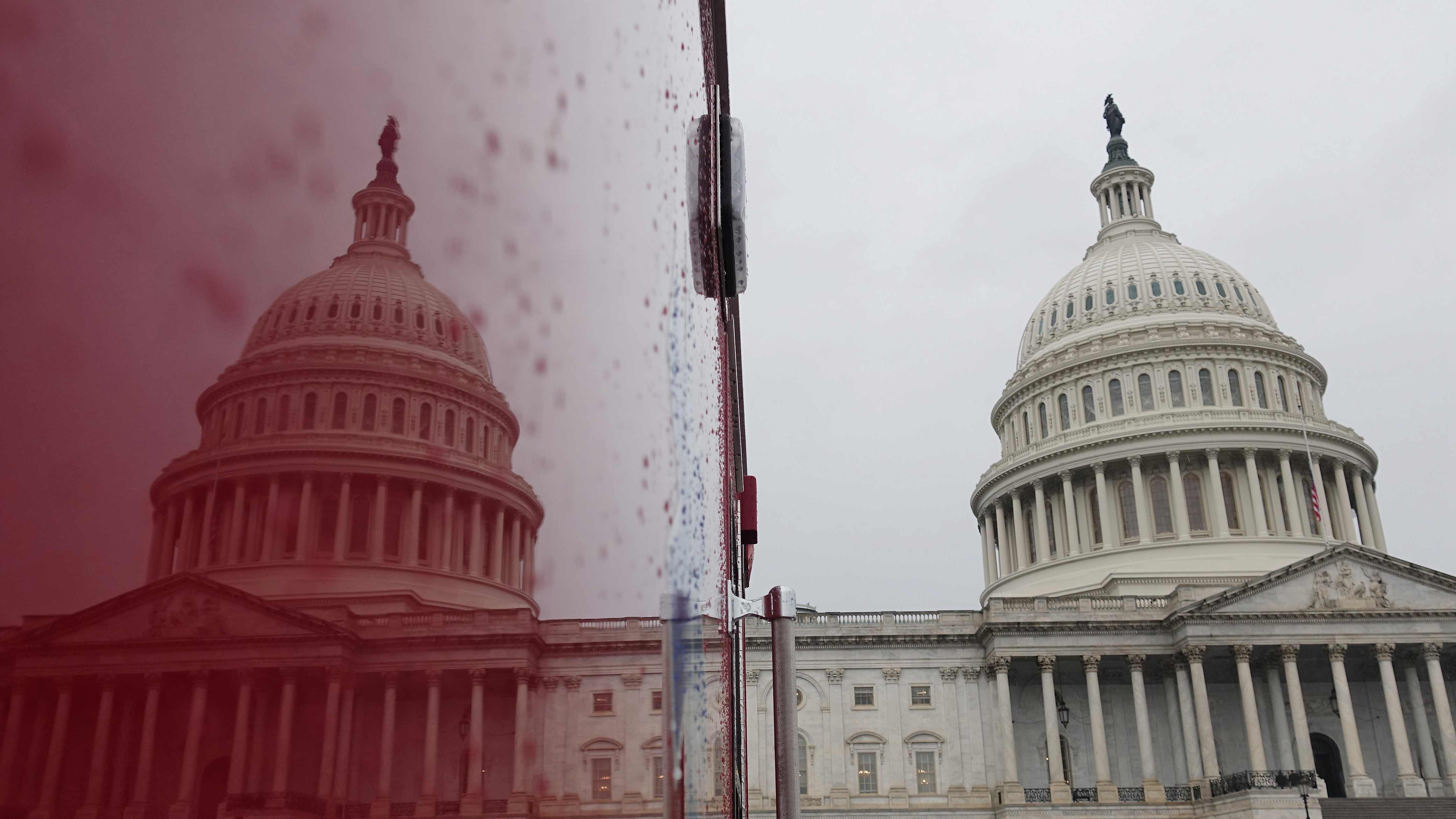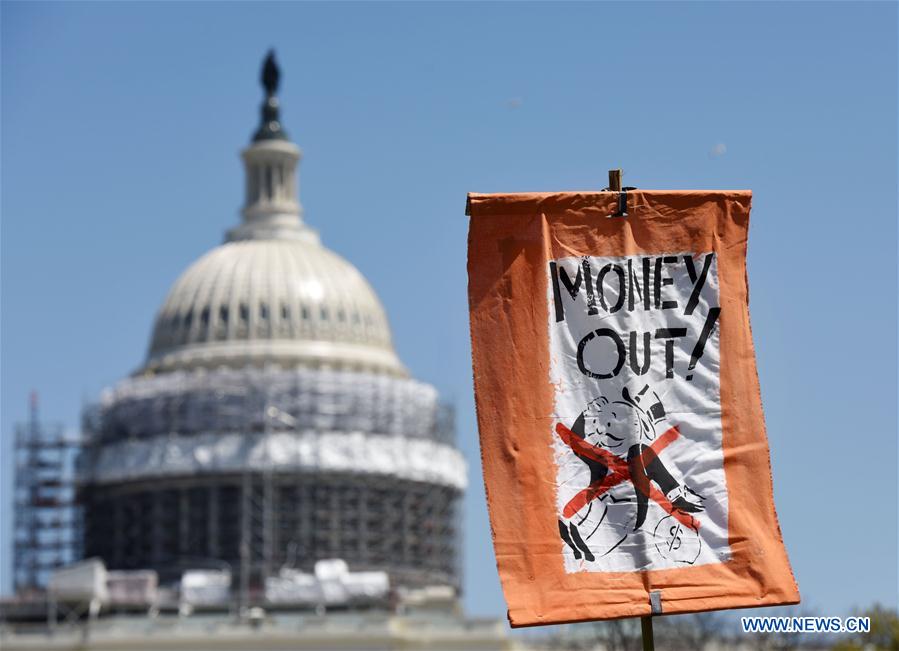
The reflection of the U.S. Capitol building on an ambulance's door in Washington D.C., United States, December 28, 2018. /Xinhua
The reflection of the U.S. Capitol building on an ambulance's door in Washington D.C., United States, December 28, 2018. /Xinhua
Editor's note: Joel Wendland-Liu is an associate professor of the Integrative, Religious and Intercultural Studies Department at Grand Valley State University in the U.S. The article reflects the author's opinions, and not necessarily the views of CGTN.
Western societies idealize democracy. We have created an illusion that it is the most advanced political system in which people elect representatives and participate fully in civil society. In this idealized state, people supposedly achieve greater social good through voting, civic participation, and giving "voice" to their needs. Once people make a case for change, voices heard, and opinions expressed in civil discourse, society theoretically modifies, adjusts, and incorporates new changes.
In this idealized state, society no longer needs violence or conflict. When groups or classes resort to struggle or conflict, they are earmarked as dangerous. They are dismissed or excluded from civil discourse about social change.
Such is the idealized state. Reality is quite different. In truth, democracy in the United States is confined to the already-powerful, the minority of extremely wealthy people and the dominant racial group. Most eligible Americans vote only occasionally. Most people are cynical about both the government and the impact of civic participation. Few people have the millions of dollars required to influence the political process under the current rules.
This cynicism is fostered by and helps the most powerful. The wealthiest groups maintain their power to use the state to enact their political, economic, and social agendas. This democracy for the few has been a disaster. Over the past 70 years, each decade, the U.S. has started at least one, sometimes more than one, major military conflict.
Wars have been fought under the guise of democracy, but in truth, they sought control of markets, geopolitical power, corporate profits, or control of natural resources. In addition, dozens of manufactured interventions globally have established U.S. backed or controlled dictatorships and undemocratic regimes.
These decisions have cost at minimum 10 million lives. Additionally, those choices have cost the U.S. government trillions of dollars in resources and vast amounts of goodwill. Democracy for the minority means that this week the U.S. Congress will pass a military budget of 740 billion U.S. dollars with almost no criticism of the waste and irresponsibility of such spending.

Protest banners in front of the U.S. Capitol building during a rally against money politics in Washington, DC, the United States, April 17, 2016. /Xinhua
Protest banners in front of the U.S. Capitol building during a rally against money politics in Washington, DC, the United States, April 17, 2016. /Xinhua
Democracy for the minority of the wealthiest and already most powerful has also substantially transformed U.S. society. Seventy years ago, the U.S. used a progressive tax on wealth to build a low-cost, world-class university system, sent people to the moon, built a network of highways, bridges, and tunnels. Today, it struggles to pay for real peoples' needs. Instead, militarized police forces and an expensive military bureaucracy dominate our lives.
Democracy for the minority means that state governments typically use the lion share of resources for prisons, police, and court systems, while public schools struggle to stay open and public transportation systems disintegrate.
Democracy for the wealthy minority means that lobbyists for health insurance and medical corporations consistently block a streamlined universal healthcare system. Tens of millions of Americans are excluded from health coverage, or pay massive costs for prescription drugs and medical procedures, even during a pandemic that has killed almost 130,000 American people.
The CEO of Gilead Sciences, which is developing an antiviral treatment for COVID-19, recently announced that his company's drug, developed with public resources, will cost 3,000 U.S. dollars.
Democracy for the minority has seen explosive growth since the 1970s of racist police and criminal justice systems. These systems brutalize and disproportionately imprison millions of African Americans and Latin American people. In a country with less than 5 percent of the world's population, we have the world's highest rate of imprisonment, far surpassing countries that the U.S. government regularly demonizes as undemocratic. About 7 million Americans are in prison or are under court-ordered surveillance through parole or probation.
Further, control of the democratic process by the wealthiest minority has created a criminal justice system dictated by privately-owned corporations that have a profit motive for expanding the number of arrested, convicted, and imprisoned people.
Democracy for the minority means that state and local governments, rather than fund high-quality public education, use up their limited resources to pay private security companies to train police to adopt a racist "warrior mentality" to confront and control non-white populations.
Democracy for the wealthy few means that one man was able to use his fortune to gain control of the machinery of the U.S. state, to manipulate his power to enrich his family and businesses, promote an agenda of a "white power" and authoritarianism, and consistently lie to the American people.
The May and June uprising against racist police brutality that began in Minneapolis in protest of the murder of George Floyd has become a struggle against cynicism. It has become both a struggle against Trump's abuse of power and a fight to overcome democracy for the wealthy few. The uprising has become a struggle to reshape power relations, wrest control of resources from the dominant minority, and redirect the state's machinery to serve the needs of the majority of the people.
(If you want to contribute and have specific expertise, please contact us at opinions@cgtn.com.)